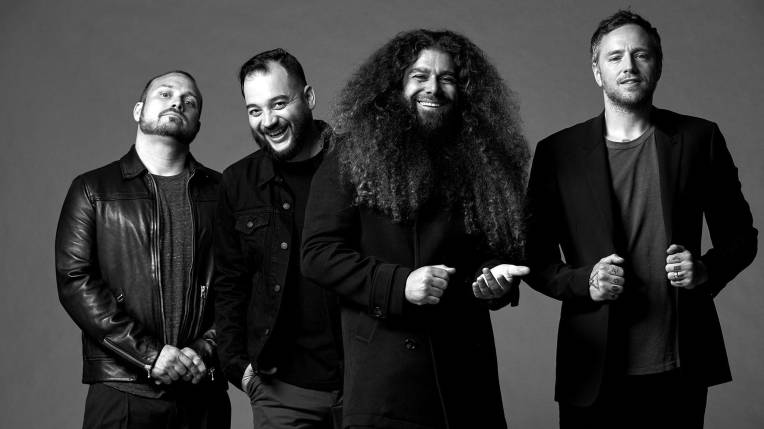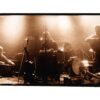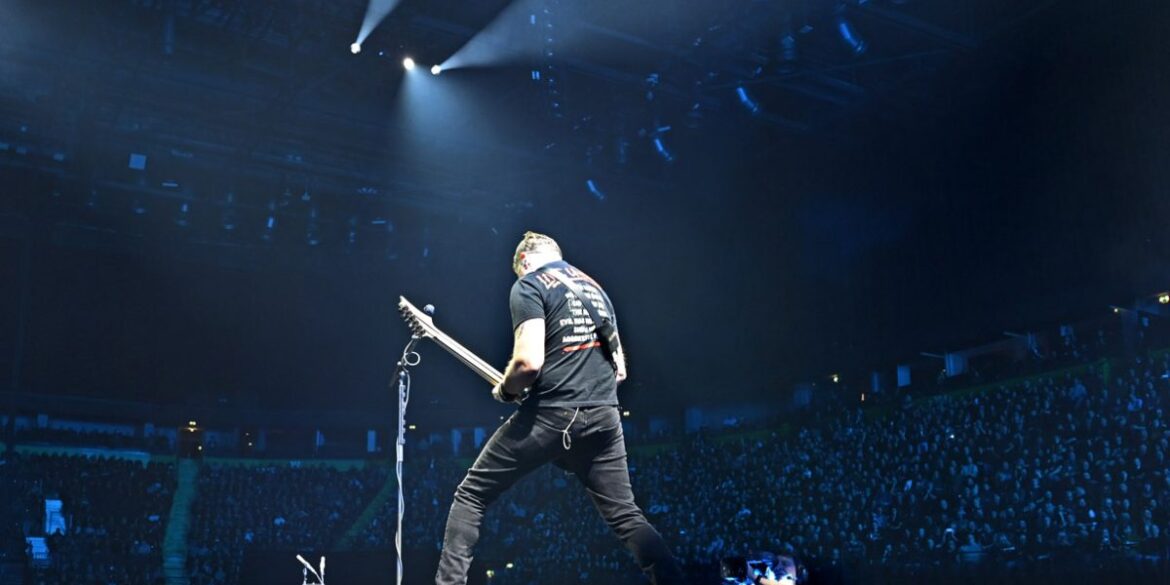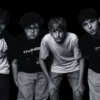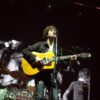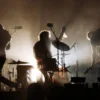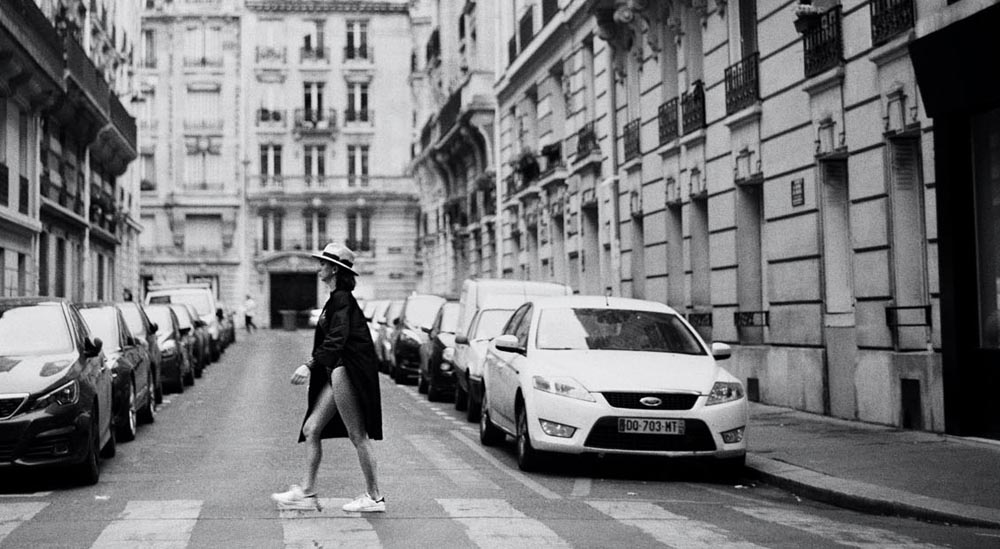There are bands whose mythology feels so expansive that stepping into one of their gigs feels less like attending a show and more like crossing into another universe. Coheed and Cambria are one of those bands. Known for their complex narrative world, The Amory Wars, and a catalogue that twists between technical ferocity and delicate melody, they’re a group that demands full immersion. The thing is, I came to the Manchester Academy show on the 20th of October as a curious observer, not a die-hard disciple. I admired their hits and reputation as storytellers but had never properly dived into the deep corners of their story. What I wanted from this night was simple enough: to be taken on a journey that made sense to me, to connect without needing to know every chapter that came before.
From the moment I stepped inside, I knew I was surrounded by people who spoke the language fluently. The crowd was made up of clear music lovers, people for whom this wasn’t just another night out but an event that mattered. You could see it in the merch, in the rehearsed excitement as snippets of guitar warmups echoed from the stage, and in that charged hush that falls moments before the lights drop. Manchester Academy was absolutely heaving, the air dense with that peculiar kind of anticipation that only true fans bring. Yet, even as an outsider, it was a welcoming crowd. There was no elitism, none of the detached cool you sometimes find at gigs. These were people who genuinely loved music, and they were ready to be lifted out of ordinary life for a couple of hours.
When the lights finally dimmed and the intro of “Goodbye, Sunshine” washed over the room, the effect was immediate. The stage came alive in a flood of deep blues and reds, and Claudio Sanchez appeared front and centre, his signature mane of hair catching the light like something mythic. He didn’t speak, didn’t need to. The first few notes of his guitar and that piercing, clear voice were enough to ignite the crowd into full voice. The group do not rely heavily on interaction, but in Coheed and Cambria’s world, it feels intentional, not aloof. They let the music do the talking. It is storytelling through volume and precision rather than words between songs.
What hit me straight away was how striking their musicianship is. There’s a sharpness, a discipline to every note, but it never feels robotic. Tracks like “Shoulders” and” Blood Red Summer” built from tense openings into full, cathartic releases. Their songs have a knack for drawing you in slowly before throwing you down a ravine of sound. Watching it happen live revealed just how tight their chemistry is. You can see the connection between each member: subtle nods, quickly shared glances, the kind of wordless communication that only years of playing together can achieve.
The sonic journey they build onstage isn’t easy to categorise. There are moments where they sound like pure progressive rock, elaborate and intricate, filled with odd time signatures and sudden turns. Then, seconds later, they slip effortlessly into pop-like hooks that soar above the room. That tension between complexity and accessibility is what makes them compelling. It’s as if they are constantly walking a tightrope, daring each song to collapse under its own weight, but it never does.
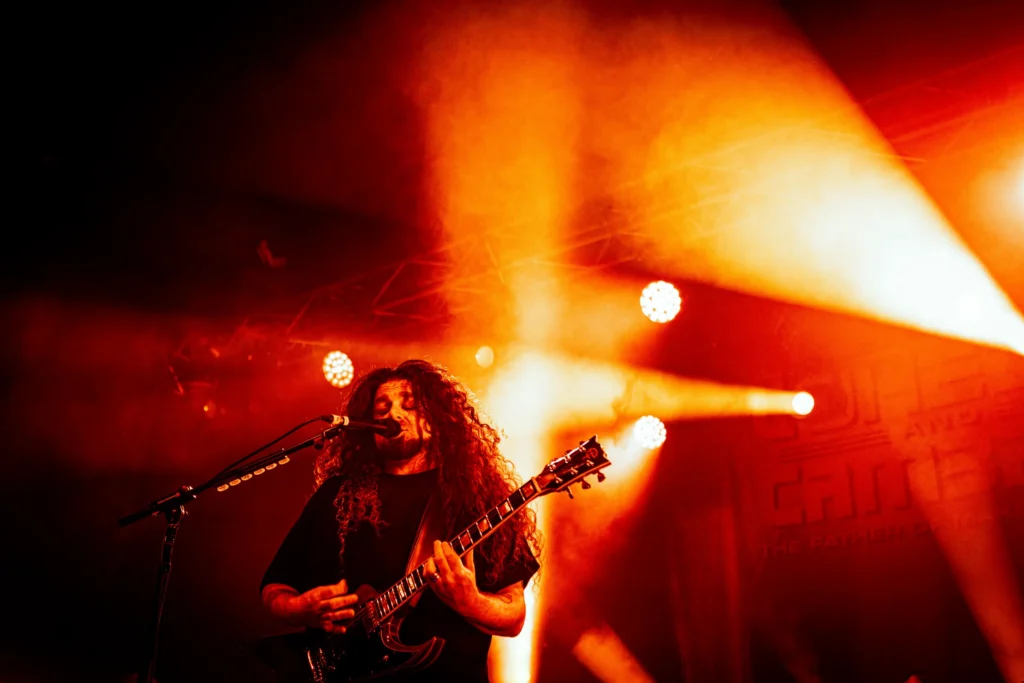
Coheed and Cambria – Maryleen Guevara
One of the first songs that truly struck me was “Everything Evil”. Even for someone not steeped in their lore, you could feel the depth and darkness woven into it. The room seemed to shift as fans lifted their voices louder, almost ritualistic in how they responded to every transition. There was no doubt that this was a moment for them. Still, even to fresh ears, it was gripping. Sanchez’s voice, both plaintive and commanding, cut through every layer of aggression and landed right in your chest. The band’s control here was astounding; guitars roared without ever muddying each other, and the drums carried the perfect balance between precision and abandon.
“Number City” came as a bright contrast, a song that carried a propulsive pulse more than despair, a moment to breathe and sway. The crowd danced, finally loosening slightly from the near-religious intensity of the opening hour. Yet it still carried that uncanny Coheed balance: cheerful melody atop something quietly sinister. It was around this point that I realised just how deeply crafted the flow of the set was. Though they didn’t provide crowd banter or narrative explanations, every change in tone felt deliberate. If you followed emotionally instead of intellectually, you were rewarded just as much as the devoted fan with every lyric memorised.
When “The Suffering” arrived mid-set, there was a collective surge of joy. It’s one of their most accessible songs for a reason, and hearing it live was like catching a burst of sunlight through dark clouds. The riff rings like a battle cry while the chorus feels designed for voices to intertwine. It was in that moment that I stopped caring about what story thread the song fit into, because it connected on the most human level. That might be Coheed and Cambria’s greatest strength: under all the conceptualism and science fiction, the emotion is utterly real.
Visually, the show was astonishing without being overblown. The lighting synced perfectly to the shape of each song, occasionally strobing to accentuate sudden drops, then easing into wide washes of white that made the stage glow ethereally. It reminded you that they’ve been doing this long enough to know when to show restraint. It’s dramatic, sure, but never garish.
As the night progressed toward its climax, it became clear that the band had built this set around a sense of ascent. It was less a linear concert and more a spiral upward, every track slightly bigger, slightly more consuming. When “A Favor House Atlantic” finally blasted from the speakers, the room exploded. Even from my more neutral standpoint, I was swept into it. That chorus is impossible to resist. The floor underneath seemed to shake with the crowd’s unified jumping, arms raised high, voices completely raw. It was a joyful chaos, and Sanchez, finally grinning for the first time all night, leaned out to soak it in for a moment before diving into the next riff.
Then came “In Keeping Secrets of Silent Earth: 3”, a showcase of everything Coheed and Cambria are about: narrative, precision, theatricality and power. Hearing hundreds of people chant “man, your battle stations” was something close to awe-inspiring. It felt ritualistic, an instinctive shared language that transcended any literal meaning. Even I, not knowing the full lore, could sense the weight behind it. That’s when I fully understood why they inspire such fierce devotion. It is not about understanding every detail. It’s about allowing yourself to be swept away by the scope and sincerity.
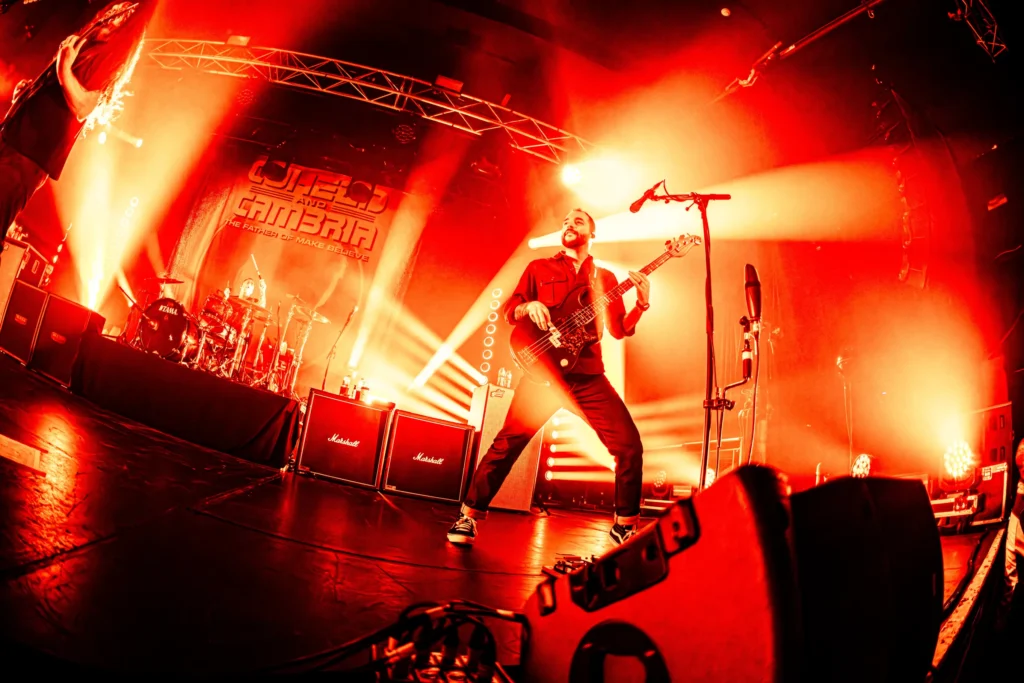
Coheed and Cambria – Maryleen Guevara
The main set closed, and Sanchez returned alone with an acoustic guitar for “Corner My Confidence”. It was spellbinding how silence fell across a crowd that had been roaring seconds earlier. His voice, unadorned and fragile, echoed beautifully around the room, revealing the emotional conductor hidden behind the science fiction veneer. The gentleness of that performance reminded everyone that beneath all the drama, these are deeply human songs.
When the rest of the band returned for “The Continuum III: Tethered Together”, it acted as the perfect bridge back into their grand universe. The music swelled with elegance and sophistication, a reminder that Coheed and Cambria’s storytelling continues to evolve even decades into their career. And then, as if summoned by fan demand, the unmistakable opening riff of “Welcome Home” brought everything to a blazing conclusion. If you’ve ever heard that song live, you know it doesn’t just end a show; it detonates it. The sight of the entire audience headbanging in perfect rhythm, every light pulsing like a heartbeat, encapsulated the scale of the experience. The final solo drew out into something furious yet oddly joyous, a perfect end to the journey they had built.
As the last notes rang out and Claudio raised his guitar triumphantly, the audience delivered a roar that vibrated through the room. It felt less like a cheer and more like an acknowledgement, a kind of collective thank you. The band soaked it in for a moment, then quietly left the stage, leaving behind a hum of feedback and a strangely cathartic silence.
Walking out into the crisp Manchester night, my ears still ringing, it struck me how completely they had succeeded in what I wanted from the night. I came hoping to be taken somewhere, to be connected even without a map of the lore, and they did exactly that. The journey was emotional, absorbing, and sincere. Coheed and Cambria’s music doesn’t demand knowledge; it asks for presence. If you give them that, even for one night, they will return it tenfold.
And as I joined the stream of people spilling onto Oxford Road, some beaming, some still quietly processing, I realised that this is what truly great live music does. It folds you into its world and, for a brief time, makes you feel like you belong there.


